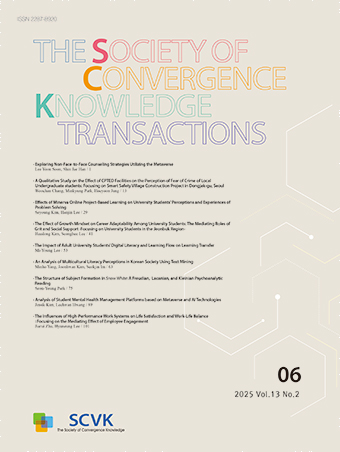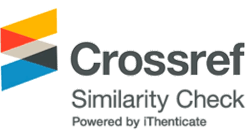Research Article
Abstract
References
Information
본 연구는 국내 남녀대학생의 성역할 고정관념, 자아존중감, 스트레스 대처, 성적자기주장 정도를 파악하고, 성적자기주장에 영향을 미치는 요인을 분석하기 위해 시행되었다. C시에 재학중인 남녀대학생 169명을 대상으로 실시하였다. 수집된 자료는 SPSS 23.0 통계프로그램을 이용하여 기술통계, t-test, ANOVA, 상관관계분석을 하였고, 성적자기주장에 영향을 미치는 요인을 파악하기 위해 다중회귀분석을 실시하였다. 연구결과, 측정 변인 중 성역할 고정관념, 자아존중감, 스트레스 대처, 성별, 연령 등이 성적자기주장에 유의미한 영향을 주는 인과적 요인이었다. 특히 성역할 고정관념(β=-.25, p=.008), 성별(여학생)(β=-.17, p=.007)은 성적자기주장에 음의 인과관계를 보였고, 자아존중감(β=.35, p<.001), 스트레스 대처(β=.22, p=.033), 연령(β=.18, p=008)은 양의 인과관계를 보였으며, 이들 변수들의 성적자기주장에 대한 총 설명력은 34.8%로 나타났다. 본 연구는 자신의 성적권리 보호와 이성과의 친밀감 형성에 필수적인 성적자기주장을 높이기 위한 요인을 파악하였고, 향후 국내 대학생의 성적자기주장을 향상시킬 수 있는 다양한 프로그램 및 교과목 개발을 위한 유용한 기초자료로 활용될 수 있을 것이다.
This study was done to examine the relation of gender role stereotype, self-esteem, stress coping of university students in Korea, and to identify factors influencing sexual assertiveness. A convenience sample of 169 students was selected. Data were collected using a structured questionnaire. The collected data were analyzed using descriptive statistics, t-test, ANOVA, Pearson correlations and multiple regression analysis with the SPSS/WIN 23.0 program. The sexual assertiveness of university students in Korea showed a significant relationship with gender role stereotype, self-esteem, stress coping. The significant factors influencing were gender role stereotype (β=-.25, p=.008), self-esteem (β=.35, p<.001), stress coping (β=.22, p=.033), gender (β=-.17, p=.007), and age (β=.18, p=.008). These variables explained 34.8% of the variance in sexual assertiveness. This study identified the factors to increase the essential sexual assertiveness in the intimacy formed with their sexual rights and reason, and take advantage of useful data for a variety of programs and courses developed to improve sexual assertiveness of Korean university students.
- J.M. Patricia, O. Kathryn, L.H. Lisa, W. Laura, M.G. Diane, R.G. Pemela, J.B. Gary, “Sexual assertiveness scale for women : development and validation”, Journal of Personality and Social Psychology, Vol. 73, No. 4, pp. 790-804, 1997. 10.1037/0022-3514.73.4.790 9325594
- 김경원, 강경화, 정금희 “대학생의 자기효능감과 성적자율성”. 한국보건간호학회지, 제26권 제1호, pp. 51-59, 2012.10.5932/JKPHN.2012.26.1.051
- 통계청, 2018.
- J.V. Ouytsel, V. Ponnet, M. Walrave, L.D. Haenens, “Adolescent sexting from a social learning perspective”, Telematics and Informatics, Vol. 34, No. 1, pp. 287-298. 2012. 10.1016/j.tele.2016.05.009
- C. Sabina, M.A. Straus, “Polyvictimization by dating partners and mental health among U.S. College Students. Violence and Vitims”, Vol. 23, pp. 667-682, 2008. 10.1891/0886-6708.23.6.667 19069560
- 한성훈, “데이트 폭력에 대한 대응방안에 관한 연구”, 경상대학교 법학연구소, 제25권 제4호, pp. 265-284, 2017.
- 심정신, 이영숙, 오숙희, “대학생의 성역 할 고정관념, 성폭력 인지도 및 성폭력 허용도에 관한 연구”,여성건강간호학회지, 제18권제2호, pp. 117-125, 2012.
- 이은숙, 강희순, “대학생의 성별에 따른 성역할 고정관념, 성적 자기주장성, 성폭력 인식도, 성폭력 허용도 및 데이트 성폭력 경험”, 동서간호학연구지, 제 20권 제1호, pp. 48-56, 2014. 10.14370/jewnr.2014.20.1.48
- D.M. Ackard, D. Neumark-Sztainer, “Date violence and date rape among adolescents: Associations with disordered eating behaviors and psychological health”, Child Abuse Neglect, Vol. 26, No. 5, pp. 455-473, 2002. 10.1016/S0145-2134(02)00322-8
- 서영숙, “초등학교 아동의 성역할고정관념의 발달적 경향과 성평등역할교육에 따른 변화”, 아세아여성문제연구소, 제25권, pp. 185-217, 1986.
- M. Rogenberg, “Society and the Adolescent Self-Image: Conceiving the self”, NewYork: Basic Book, Inc, 1979.
- S. Coopersmith, “The antecedents of self-esteem”, San Fransisco: W.H. Freeman, 1967.
- 송혜성, “여대생의 성과 자기주장성 및 자아존중감과의 관계”, 경상대학교 석사학위논문, 2006.
- 이선경, “이성교재하는 10대 여학생의 성 접촉과 자아존중감 및 자기주장성과의 관계”,연세대학교 석사학위논문, 2001.
- I.R. Vaughn, S. Rupal, M.W. Constance, “Is lack of sexual assertive\-ness among adolescent and young adult women a cause for concern?”, Perspectives on Sexual and Reproductive Health, Vol. 34, No. 4, pp. 178-183, 2002. 10.2307/3097727 12214907
- R.S. Lazrus, S. Folkman, “If it changes it must be a process: A study of emotion and coping during three stages of collage examination”, Journal of personality and Social Psychology, Vol. 4, pp. 150-170, 1984. 10.1037/0022-3514.48.1.150 2980281
- F. Faul, E. Erdfelder, A. Buchner, A.G. Lang, “Statistical power analyses using G*Power 3.1: tests for correlation and regression analyses”, Behavior Research Methods, Vol. 41, No. 4, pp. 1149-1160, 2009. 10.3758/BRM.41.4.1149 19897823
- 김동일, “성의 사회학”, 서울: 문음사, 1991.
- 박유정, “대학생의 성 고정관념과 성 역할 정체감 및 자기의식의 관계”, 서강대학교, 석사학위논문, 2000.
- M. Rosenberg, “Society and the adolescent self-image”, Princeton, NJ: Princeton University Press, 1965. 10.1515/9781400876136
- 전병제, “Self-esteem:A testofits measurability”, 연세논총, 제11권, pp. 109-129, 1974.
- S. Folkman, R.S. Lazarus, “If it changes it must be a process: Study ofemotion andcoping during three stages of a college examination”, Journal of Personality and Social Psychology, Vol. 48, pp. 150-170, 1985. 10.1037/0022-3514.48.1.150 2980281
- 김정희, “지각된 스트레스,인지세트 및 대처방식의 우울에 대한 작용”, 서울대학교 대학원, 박사학위논문, 1987.
- 정진아, “대학생용 성적자기주장 척도개발 및 타당화”, 경성대학교 대학원, 석사학위논문, 2016.
- 김효정, “미혼 여성의 성적 자기주장 영향요인”, 한국산학기술학회논문지, 제19권 제10호, pp. 467-474, 2018.
- 이혜림, “ 여대생의 성역할고정관념이 성적자기주장에 미치는 영향: 자아존중감의 매개효과 ”, 명지대학교 대학원, 석사학위논문, 2019.
- 조규영, 김윤희, “여대생의 성적 자기주장에 영향을 미치는 요인”, 한국자료분석학회, 제16권 제5호, pp. 2795-2806, 2014.
- 김영희, 문승태, 강희순, “대학생의 성적 자기주장에 영향을 미치는 요인”,여성건강간호학회지, 제19권 제3호, pp. 166-175, 2013.
- 김보미, “남녀 대학생의 부모-자녀간 의사소통 및 자아존중감과 성적자기주장과의 관계 비교연구”, 고신대학교 대학원, 석사학위논문, 2014.
- 이난희, 정준식, 송혜숙, “여대생의 성경험과 성적 자기주장에 대한 영향요인에 관한 연구”, 한국산학기술학회논문지, 제17권 제3호, pp. 414-422, 2016. 10.5762/KAIS.2016.17.3.414
- Publisher :The Society of Convergence Knowledge
- Publisher(Ko) :융복합지식학회
- Journal Title :The Society of Convergence Knowledge Transactions
- Journal Title(Ko) :융복합지식학회논문지
- Volume : 7
- No :4
- Pages :149-159
- DOI :https://doi.org/10.22716/sckt.2019.7.4.061




 The Society of Convergence Knowledge Transactions
The Society of Convergence Knowledge Transactions







